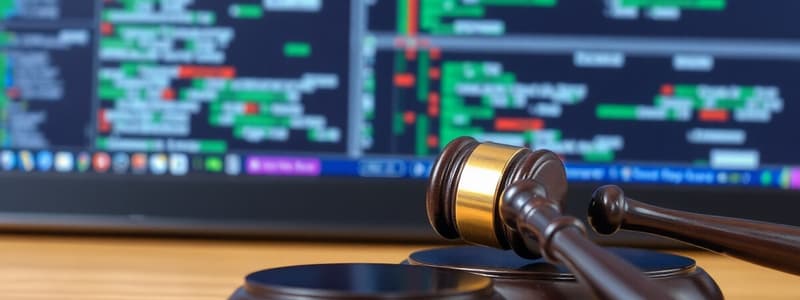Podcast
Questions and Answers
What does the term 'objection of conscience' refer to in the context of fundamental rights and duties?
What does the term 'objection of conscience' refer to in the context of fundamental rights and duties?
- A refusal to comply with legal obligations
- An obligation to uphold data processing laws
- A principle that allows for protection of individual beliefs (correct)
- A disregard for collective rights
Which data category is explicitly excluded from the scope of application of autonomous law?
Which data category is explicitly excluded from the scope of application of autonomous law?
- Data concerning the deceased
- Data that can be automatically processed
- Data processed by courts
- Civil Registry data (correct)
Which of the following statements regarding data processing by courts is accurate?
Which of the following statements regarding data processing by courts is accurate?
- Data can be modified without any legal limitations
- Data processing must adhere to specific legal regulations (correct)
- Courts are exempt from data protection laws
- Only the Ministry of Justice can process legal data
Who is allowed to access data concerning deceased persons?
Who is allowed to access data concerning deceased persons?
What cannot be done to the data of deceased persons, according to the stated regulations?
What cannot be done to the data of deceased persons, according to the stated regulations?
Which of the following is a requirement for data accuracy under Rosamue 2016/679?
Which of the following is a requirement for data accuracy under Rosamue 2016/679?
What is the primary focus of Law 3/1981 in the context of data protection?
What is the primary focus of Law 3/1981 in the context of data protection?
Which entity's data processing falls under the regulations of Law 6/1985?
Which entity's data processing falls under the regulations of Law 6/1985?
Which of the following statements about the responsibility of the data processor is correct?
Which of the following statements about the responsibility of the data processor is correct?
What does the confidentiality obligation entail for organizations working with data?
What does the confidentiality obligation entail for organizations working with data?
Which clause emphasizes that professional secrecy obligations are irrespective of the confidentiality obligation?
Which clause emphasizes that professional secrecy obligations are irrespective of the confidentiality obligation?
What is the correct interpretation of the confidentiality principle in relation to professional secrecy?
What is the correct interpretation of the confidentiality principle in relation to professional secrecy?
What is an exception regarding data access or modification for deceased individuals?
What is an exception regarding data access or modification for deceased individuals?
What does Rosamue 2016/679 state regarding data accuracy?
What does Rosamue 2016/679 state regarding data accuracy?
Which of the following does Rosamue identify as an exception regarding the data processor's responsibilities?
Which of the following does Rosamue identify as an exception regarding the data processor's responsibilities?
Which statement correctly represents the obligations established in the discussed clauses?
Which statement correctly represents the obligations established in the discussed clauses?
Flashcards
Objection of Conscience
Objection of Conscience
A legal principle that allows individuals to refuse participation in certain actions based on their personal beliefs or moral convictions.
Data Protection Law Corpus
Data Protection Law Corpus
The comprehensive set of legal frameworks and regulations pertaining to data protection and privacy.
Data Processing by Courts and Tribunals
Data Processing by Courts and Tribunals
Data processed by government institutions, such as courts and tribunals, falls under the scope of the Rosamue 2016/679 and other related laws.
Data Protection Laws Applicable to Courts
Data Protection Laws Applicable to Courts
Signup and view all the flashcards
Data Processing of Deceased Individuals
Data Processing of Deceased Individuals
Signup and view all the flashcards
Data Accuracy in the Rosamue 2016/679
Data Accuracy in the Rosamue 2016/679
Signup and view all the flashcards
Data Accuracy Responsibility
Data Accuracy Responsibility
Signup and view all the flashcards
Exceptions to Data Accuracy Responsibility
Exceptions to Data Accuracy Responsibility
Signup and view all the flashcards
Confidentiality Obligation in Rosamue
Confidentiality Obligation in Rosamue
Signup and view all the flashcards
Confidentiality and Professional Secrecy
Confidentiality and Professional Secrecy
Signup and view all the flashcards
Confidentiality Complements Professional Secrecy
Confidentiality Complements Professional Secrecy
Signup and view all the flashcards
Complementary Data Protection
Complementary Data Protection
Signup and view all the flashcards
Universal Confidentiality Obligation
Universal Confidentiality Obligation
Signup and view all the flashcards
Study Notes
14D
- Fundamental rights and duties
- Article 30.2: Objection of conscience
- Data protection law
- Data subjects' rights (if applicable to the data, e.g. digital)
- Data retention and application of the law
- Exclusion of certain data topics from specific law applications
- Data of non-living entities (e.g. deceased individuals) falling outside the scope of a law
- Reference to a specific court ruling (Royamue case 2016/679)
Act 2.4
- Data processing (treatment)
- Laws governing data processing, and applicability of different laws
Act 2.5
- Data processing, authorities responsible
- Different laws applicable
- Dates associated with different laws (e.g., 6/1985, 3/1981)
- Government entities related to data processing
- Specific laws pertaining to judicial processes/offices
Act 3. Deaths (or Data of Deceased)
- Specific handling of information related to deceased individuals
- Rights of heirs
- How to access information or data concerning deceased parties
- Information associated with an individual's death/passing away
Act 4. Accuracy of Data
- Data accuracy required
- Responsibility for data accuracy
- Responsibility for correcting errors.
Act 5. Data Confidentiality
- Confidentiality obligations
- Responsibility for maintaining confidentiality
- Types of responsibility
- Exemptions
5.2
- Professional confidentiality
- Professional obligations
- Confidentiality obligations (as related to professional positions) and compliance.
- Consequences for not respecting confidentiality rules.
5.3
- Obligations established (in a legal context)
- Rules/laws applicable during specific points in time or following an event
Studying That Suits You
Use AI to generate personalized quizzes and flashcards to suit your learning preferences.




